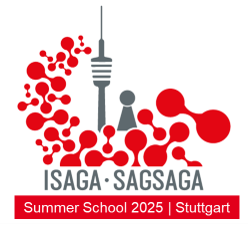
Welcome to ISAGA Summer School 2025
The Summer School, held from 07-11 July 2025 at Hochschule der Medien (aka Stuttgart Media University) combines first-hand experiences of simulations and games, with theoretical analysis and in-depth discussion of key issues in the field of simulations and games as educational tools and strategies. It has evolved as a collaborative, invigorating, and rewarding space for personal skill development, the launching of new research projects, support for innovative and challenging uses of simulations and games and a time to expand networks and writing partnerships.
International Participants are highly appreciated, who are willing to explore the relevant topics to develop their skills.
Bachelor students are dedicated to make and learn how to design games
Future Researchers are dedicated to design, develop and deliver Gamebased Research
An attractive social program included is included in the week’s activities:
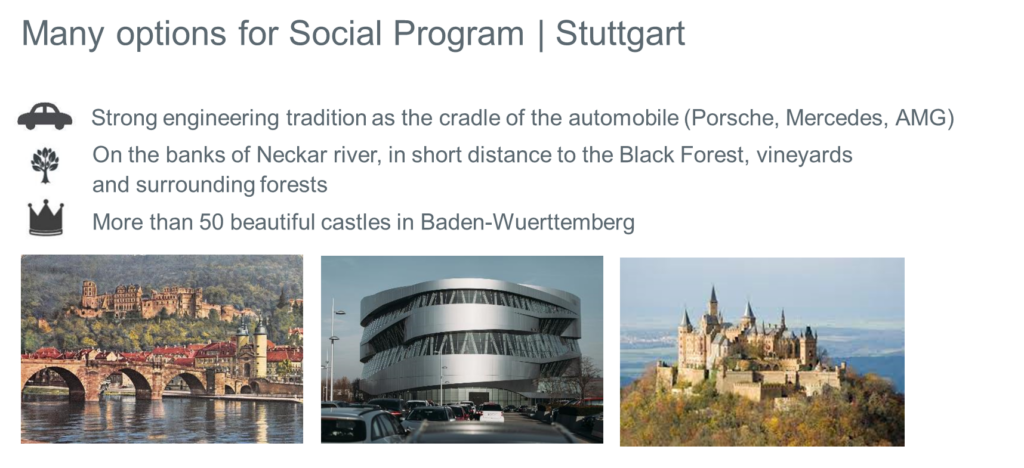
Host in 2025
The Summer School 2025 is hosted by Stuttgart Media University, namely by Prof. Dr. Helmut Wittenzellner, Dept. Mediamanagement & Engineering.
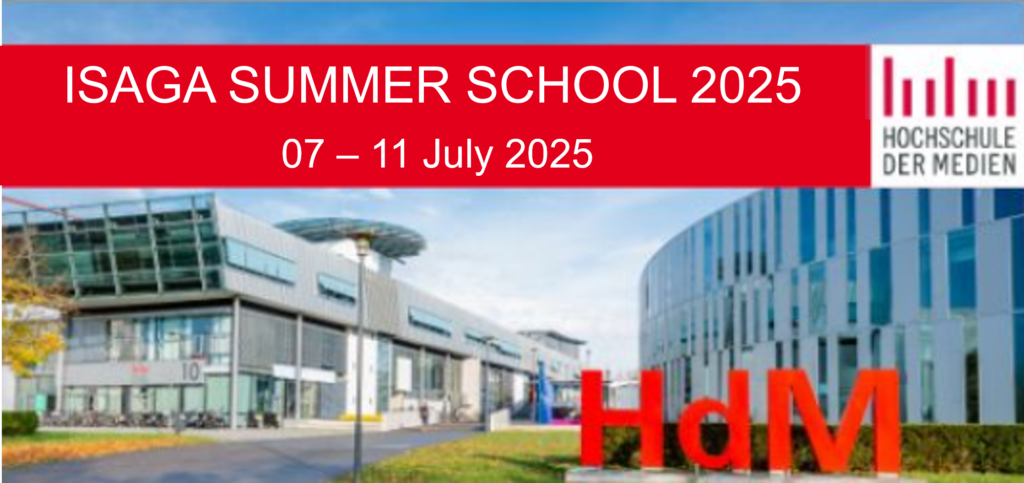
Since 25 years, Helmut Wittenzellner has been a trainer of simulation games and gamification systems for education, business, and consulting. In 2005 he started developing his first own games. Together with his valuable colleagues, Willy Kriz, Marcin Wardaszko, Eberhard Auchter and Herbert Schmid, he has co-authored many publications on game-based learning and serious games and is passionate about game design and game based research.
This event will take place at Hochschule der Medien, Nobelstr. 10, 70569 Stuttgart (rooms tba).
Speakers and presenters
- Prof. Dr. Marcin Wardaszko, Director of Center for GamingSimulation and Gamification (CGSiG), Head of Department of Quantitative Methods and Information Technology and the MBA IT program, Kozminski University, Poland
- Prof. Dr. Willy Kriz, Psychologist, Founder of Isaga Summer Schools, Fachhochschule Vorarlberg, Austria
- Prof. Paola Rizzi, Urban Planner, Founder of Isaga Summer Schools, Università degli Studi di Sassari, Italy
- Prof. Dr. Toshiko Kikkawa, Psychologist, Keio University Tokio, Japan
Team Mentors
- Dr. Weronika Weronika Szatkowska, Kozminski University, Poland
- Prof. Dr. Nicolas Becu, La Rochelle University
Hosting Organizations
Hochschule der Medien, ISAGA, SAGSAGA.
Who should come?
- Educators using simulations and games for learning in all levels of education
- PhD candidates and students either employ simulation for research or research the design and use of simulations and games
- Simulations and game designers wanting to expand their repertoire of design concepts
- Researchers using – or considering – simulations and/or games as research methods or tools.
The number of participants in Summer Schools is aimed from 12 to 25 and the number of training experts is aligned with the number of participants.
Learning Themes
Educational skills and knowledge
Depending on participants‘ previous experience, novices and experts will work on relevant topics in suitable groupings and share their understanding and discoveries collaboratively.
Evaluation of simulations and games and assessment of them for Research
Participant’s interests shape choices regarding time spent on assessment and/or evaluation of learning gained from simulations and games and their usages for research purposes.
Sharing knowledge and skills
The results of each afternoon’s activities will be shared via engagement in relevant games and simulations, and impromptu lectures and discussions. A social program will support a friendly and collaborative atmosphere throughout the week.
Objectives
Learning outcomes for all participants include
- Acquiring knowledge about different types of simulations and games and fields of practice where they are used
- Exploring development of personal expertise as shared by experienced lecturers
- Expanding personal understanding of the domains of knowledge included in the phrase “simulations and games for learning”
- New perspectives on attending to the needs of educators considering the use of simulations and games for learning
Specific outcomes – depending on the choice of afternoon intensive workshop may include –
- Building competences to facilitate simulation games successfully
- Learning about the possibilities and pitfalls of facilitating simulation games
- Gain confidence in dealing with difficult situations during game performance
- Get knowledge of a set of methods for facilitating simulation games
- Learning how to pass these skills on to novice facilitators
- Building teaching resources for inclusion in simulations and game packages
- Addressing methodological and analytical questions concerning research on game-based teaching and learning
- Understanding how ‘learning effectiveness’ can be researched regarding the use of simulation and games
- Expanding knowledge about methods for evaluating simulation games as learning tools and strategies and/or using simulations and games to assess learning
Educational skills and knowledge
To address this theme, the staff will introduce and explore design principles and models for incorporating simulations and games into education programs and curricula. The learning process will include specific aspects of running simulation games which will be discussed, actively trialled, and applied where possible. The learning approach is based on active learning principles and will aim to address individual learning goals as well as shared ones.
Depending on participants‘ previous experience, novices and experts will work on relevant topics in suitable groupings and share their understanding and discoveries collaboratively.
Evaluation of simulations and games and assessment of them for research
To address the theme of assessing and evaluating learning and the relative benefits and contributions of simulations and games for both processes staff will introduce participants to current approaches and lead a collaborative approach to developing relevant evaluation and assessment strategies. Participant’s interests will shape the choices made regarding time spent on assessment and/or evaluation of learning gained from simulations and games and their usages for research purposes.
Sharing knowledge and skills
The Summer School concept has as a core principal the sharing of skills and knowledge. Thus the results of each afternoon activities will be shared via engagement in relevant games and simulations, and impromptu lectures and discussions.
A social program will support a friendly and collaborative atmosphere throughout the week.
Program and Formats
Common activities:
- Get together and get to know each other (Metalog exercises and others)
- Gameplay experiences of different types of games (board and digital)
- Impromptu talks and presentations of experienced simulation gamers
- Reviewing results of the assessment/evaluation work
Please find here the Summer School program:
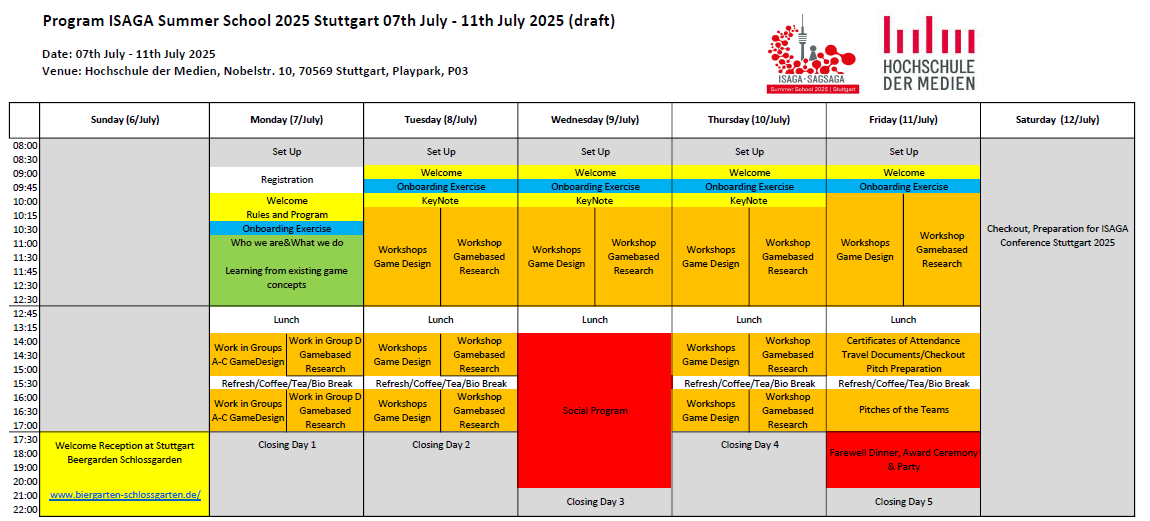
A definite five-day schedule will be developed with the training staff who accepts the invitation to contribute. So program changes may occur.
Benefits
1. European Credit Point System
Participating students may be eligible to receive 3 Credit Points for learning at ISAGA Summer School.
2. Nomination for the ISAGA Simulation & Gaming Competition
The ISAGA Simulation Gaming Competition is the opportunity to receive scientific evaluations of participants’ games by worldwide
professional game designers. All games will be really played by the reviewers, throughout discussions in debriefing and the Q&A session,
and developers may get precious comments. For more informations about the previous ISGC2024 – 3rd. see the IGSC2024 broschure
about the 3rd ISAGA Simulation & Gaming Competition.
3. Presenting your Game at the ISAGA Conference 2025
Fees
We have been able to reduce expenses for the Summer School. New rates are as shown:
Fees cover Summer school, lunch and social events (accommodation to be arranged yourself)
- Students EUR 150
- SAGA-members (i.e. JASAG, SAGSAGA) or ISAGA Associated EUR 200
- Others EUR 300
Accommodation information
We have reserved 15 double rooms for 30 incoming students at the International Student Hotel , Neckarstr. 172, 70190 Stuttgart – close to the next public transportation to Hochschule der Medien as our 2025 Summer School venue.
Travel information
Public transportation is recommended as follows:
- From Stuttgart Central Station „Hauptbahnhof“ take S1,S2,S3 to S-Bahn-exit „Universität“, then take a bus 1 station or 5 minutes walk (duration 30 Minutes).
- From Stuttgart Airport (STR) take S2, S3 to S-Bahn-exit „Universität“, then take a bus 1 station or 5 minutes walk (duration 30 Minutes).
Downloads
1. Please download here more information for registration and the Flyer_SummerSchool_ISAGA2025
2. Please find here a brochure about the previous ISAGA Simulation Gaming Competition
Register now
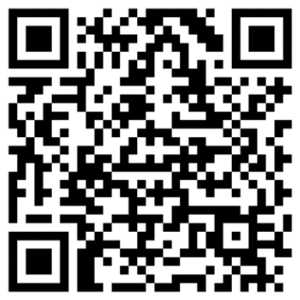
d
